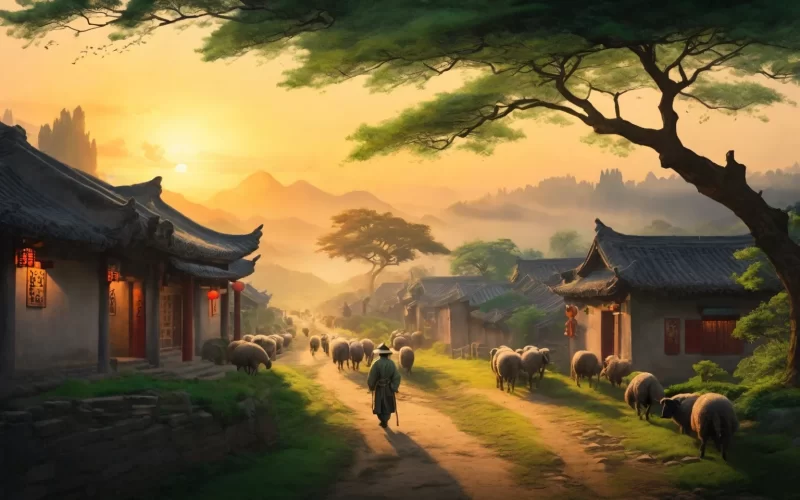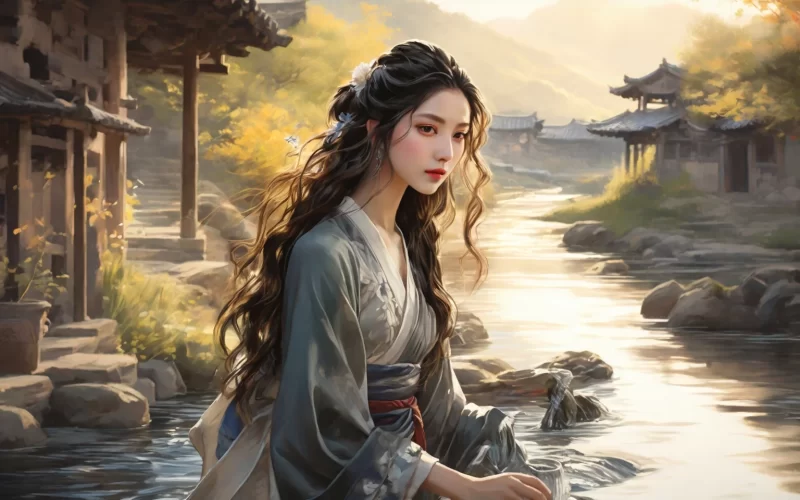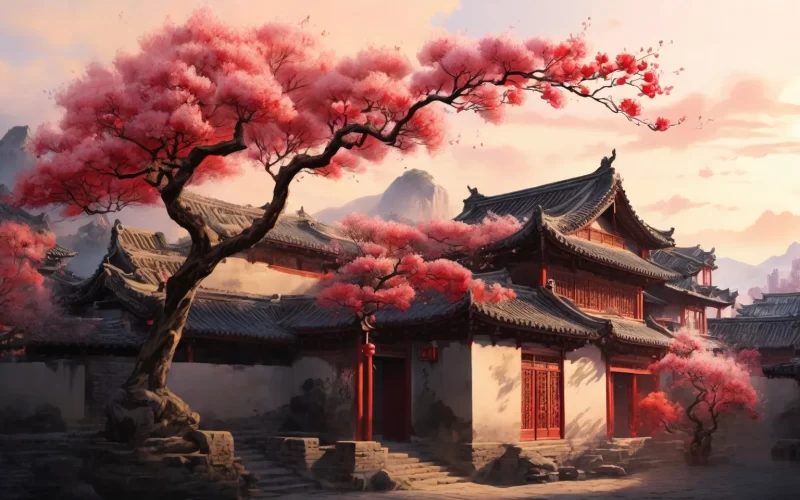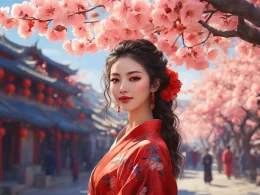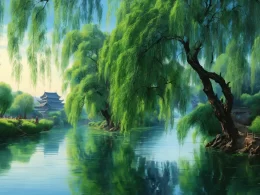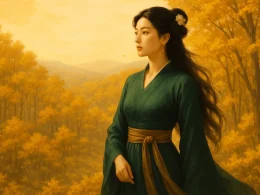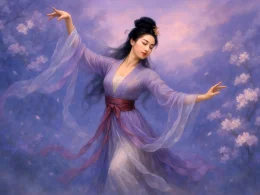In the slanting sun upon the countryside,
Cattle and sheep trail homeward down the lane.
An old, rugged man by his thatched door
Leans on a staff, thinking of his son — the herdboy.
Pheasants whir, wheat-ears are full,
Silkworms sleep, mulberry leaves grow thin.
Hoes on shoulders, the farmers return,
And meet with familiar, cheerful greeting.
…No wonder I long for the life of ease,
And sigh the old song, Oh, to Go Back Again!
Original Poem
「渭川田家」
王维
斜光照墟落,穷巷牛羊归。
野老念牧童,倚杖候荆扉。
雉雊麦苗秀,蚕眠桑叶稀。
田夫荷锄立,相见语依依。
即此羡闲逸,怅然吟式微。
Interpretation
This poem is a warm, deeply resonant twilight scroll within Wang Wei's pastoral sequence, likely composed during a period of political disillusionment and inward reflection following the dismissal of his patron, Chancellor Zhang Jiuling. With a painter's precise eye and a poet's contemplative spirit, it captures the scene of dusk returning to an ordinary village by the Wei River. Its greatness, however, lies not merely in its descriptive skill, but in how the poet uses this vision of "the leisure of others" to conduct a profound observation of his own official career and a subtle search for a spiritual path. It is a perfect poetic embodiment of the artistic philosophy to "learn from external nature to find one's inner source."
First Couplet: 斜光照墟落,穷巷牛羊归。
Xié guāng zhào xūluò, qióng xiàng niúyáng guī.
The slanting light shines on the village settlement; / Along the deep lanes, cattle and sheep return home.
The opening establishes the poem's warm yet vast tone with a wide-angle lens. "The slanting light" is a filter of both time and emotion, bathing all things in a tender, yet transient, hue. "The village settlement" is the spatial center, tranquil and self-sufficient. "The deep lanes" and "cattle and sheep return home" compose a classic image of homecoming: the lanes are the passage to rest, profound and full of expectation; the returning herd is the flowing life within that passage, unhurried and orderly. Together, the light, the lanes, and the herd weave the initial impression of a pastoral dusk that is serene and ritualistic.
Second Couplet: 野老念牧童,倚杖候荆扉。
Yě lǎo niàn mùtóng, yǐ zhàng hòu jīng fēi.
A village elder thinks of his shepherd boy, / Leans on his staff, awaiting by the rustic gate.
The focus shifts from animals to a human figure, from the movement of "returning" to the stillness of "awaiting." The elder's "thinks of" is the silent flow of kinship; "Leans on his staff, awaiting" is that feeling solidified into a statue-like form. The rustic gate is the boundary between home and field, inside and outside. The elder waiting there becomes a symbol connecting pastoral labor with familial warmth. This act of "awaiting" makes the passage of time palpable, letting a deep, tender concern flow beneath the tranquil surface.
Third Couplet: 雉雊麦苗秀,蚕眠桑叶稀。
Zhì gòu mài miáo xiù, cán mián sāng yè xī.
Pheasants call from the lush, growing wheat; / Silkworms sleep, the mulberry leaves grow sparse.
The gaze lifts slightly from the figures to the natural background that nurtures them. The poet selects two sets of highly seasonal phenomena: "Pheasants call" and "the lush, growing wheat" speak of the field's vitality and bounty; "Silkworms sleep" and "the mulberry leaves grow sparse" tell the rhythm and sacrifice of sericulture. This couplet, with its balanced parallelism, uses the "sounds" and "forms" of nature to outline the microcosm of late spring/early summer, where all things thrive in orderly growth. It is not just scenery; it is the farming season, the fundamental rhythm that sustains life.
Fourth Couplet: 田夫荷锄立,相见语依依。
Tián fū hè chú lì, xiāng jiàn yǔ yīyī.
Farmers, hoes on shoulders, pause on their way, / Meeting, they talk with fond, lingering words.
The scene returns to people, this time as a group. "Hoes on shoulders" is a posture of relaxation after labor; "talk with fond, lingering words" captures the most moving interpersonal warmth of village society—"fond, lingering" conveys the drawn-out, congenial talk and the natural, deep cohesion of the rural community. This is not a hurried greeting but the natural overflow of lives synchronized in rhythm.
Final Couplet: 即此羡闲逸,怅然吟式微。
Jí cǐ xiàn xián yì, chàng rán yín shì wēi.
Here, witnessing this, I envy such ease and peace; / Disquieted, I sing the old song, "Day Wanes."
The concluding lines reveal the theme, moving from "observation" to "feeling." They are the poem's emotional pivot and spiritual ascent. "Here, witnessing this" gathers the carefully laid scenes of the previous eight lines into the immediate catalyst for the poet's emotion. "I envy such ease and peace" is the direct emotional response—this "ease" is not idleness but the holistic state of being where humans, nature, and fellow humans exist in harmony. "Disquieted, I sing the old song, 'Day Wanes.'" historicizes and classicizes the personal mood. The song "Day Wanes" (式微) from the Classic of Poetry is often interpreted as expressing a longing for reclusion. By invoking this ancient tune, Wang Wei voices both his weariness with official life (the "waning") and his deep desire to return to natural authenticity (the "return"). "Envy," "disquiet," "sing," "wane"—complex feelings are contained within.
Holistic Appreciation
This is a pastoral narrative poem whose structure is pictorial, its emotion a flowing stream. It follows the classic narrative logic of "from far to near, from objects to people, from scene to feeling," like a gentle documentary of country life: the sunset village is the backdrop, the herd's return is the prologue, the waiting elder is the close-up, the pheasants, wheat, silkworms, and mulberries are the ambient sound and setting, the chatting farmers are the group portrait, and finally, the poet's own "envy" and "song" are the voice-over and theme. Each couplet is a relatively complete picture, all serving to build the core atmosphere of "rural ease."
Wang Wei's brilliance lies in the fact that the "ease" he describes is not an abstract philosophical concept but a tangible sense of life built from countless specific, warm, dynamic details (the light, the returning animals, the leaning stance, the pheasant's call, the lingering talk). The poet, as observer, maintains a state of "contemplative immersion": he is so deeply immersed in this twilight pastoral scene that he almost forgets his own presence; yet, through the final "envy" and "disquiet," he is sharply reminded that he is an "outsider." This tension between "being within" and "being without" is the source of the poem's power and a typical reflection of Wang Wei's psyche as a poet caught "between court and retreat."
Artistic Merits
- Pictorial Composition and Cinematic Language: The entire poem seems to employ various shots—wide-angle (village), tracking (herd returning), close-up (leaning and waiting), landscape (growing wheat, sparse leaves), medium shot (chatting farmers)—concluding with voice-over soliloquy. This visual narrative method is a high manifestation of his "poetry within painting" quality.
- Parallelism that Captures the Flow of Life: The parallelism in the third couplet ("Pheasants call" / "Silkworms sleep"; "lush, growing wheat" / "mulberry leaves grow sparse") is not only formally balanced but also precisely captures the two core productive scenes of field and homestead in late spring, showcasing the complete ecological cycle of pastoral life.
- Emotive Verbs and Adjectives: Words like "return," "think of," "await," "lush/growing," "sparse," "pause," "talk" are plain yet highly expressive, collectively painting an emotional web of unhurried pace, tender concern, growth, harvest, and warmth.
- Allusion as Self-Reference and Sublimation: The final line's allusion to "Day Wanes" is key to elevating the poem's emotion from concrete observation to historical and self-reflective thought. Its use connects personal, momentary feeling to the eternal theme of "serving" versus "withdrawing" in the Chinese scholar tradition, greatly expanding the poem's intellectual depth.
Insights
This work is like a clear mirror, reflecting both the tranquil scroll of a Tang Dynasty village dusk and the eternal dilemma of intellectuals throughout history, caught between "advancement" and "retreat." It suggests that true "ease" and contentment may lie not in distant wonders but within the order of daily life, the harmony between humans and nature, and the flow of human warmth.
For modern readers, this poem is an antidote to alienation and anxiety. It reminds us that on the single-minded track chasing efficiency and success, we should perhaps occasionally pause and learn to "witness this"—right here, right now—observe and appreciate the most ordinary yet authentic scenes of life around us: a sunset, a homecoming, a greeting, a growing field. The sigh of "disquieted, I sing 'Day Wanes'" is not so much a passive withdrawal as it is a sober self-awareness and an active search for a more complete state of being. Wang Wei may not have ultimately retreated to the Wei River, but with this poem, he built an eternal spiritual "farmhouse" for all weary hearts.
Poem translator
Kiang Kanghu
About the poet

Wang Wei (王维), 701 - 761 A.D., was a native of Yuncheng, Shanxi Province. Wang Wei was a poet of landscape and idylls. His poems of landscape and idylls, with far-reaching images and mysterious meanings, were widely loved by readers in later generations, but Wang Wei never really became a man of landscape and idylls.






